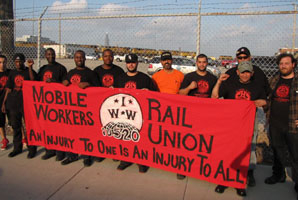Railroaders Go Wobbly, Strike against Firings

Railroad strikers in Chicago say their employer—a subcontractor—pays too little and provides unsafe vehicles. They're striking over firings, surveillance, and promises of payment for non-participation in the strike. Photo: Mobile Rail Workers Union.
Rail workers on the Union Pacific are on strike in Chicago, but they are not traditional railroaders. They are contract workers who service locomotives, work traditionally done by railroad employees paid much more than the $14 an hour at Mobile Rail Solutions.
The 30 workers who oil and fuel the locomotives and empty their toilets went public with a union recognition drive July 8. Mobile promptly hired the union-busting law firm Ogletree and Deakins. Workers filed several OSHA complaints that prompted inspections—and the company fired three of them.
Now the workers are staging an unfair labor practices strike that has seriously affected Mobile’s ability to fulfill its contract with Union Pacific. The manager has refused to meet with organizers and workers about the firings.
Their union is the Industrial Workers of the World—the Wobblies. The IWW filed unfair labor practice complaints with the National Labor Relations Board on Monday that included surveillance, intimidation, firings, and promises of payment for non-participation in the strike. The NLRB has set August 14 for a recognition election.
Because the Mobile workers are contract employees, they are not bound by the Railway Labor Act that makes it almost impossible for railroaders to strike. But neither are they in the Railroad Retirement System; they have no pension or health benefits. They are organizing for safe vehicles and for pay equivalent to that of other union workers doing the same job.
Railroad Workers United, a cross-union caucus of rank-and-filers, has been helping with the campaign by lending organizing and strategic assistance and sharing contacts with railroaders and organizations in the Chicago area. RWU has donated to the strike fund that will cover the cost of the strike and help the fired workers. You can support the Mobile Rail Workers Union by donating here.

SUPPORT LABOR NOTES
BECOME A MONTHLY DONOR
Give $10 a month or more and get our "Fight the Boss, Build the Union" T-shirt.
As the railroads prop up their bottom line by contracting out, some rail workers see contract workers as scabs and feel threatened by the companies’ continued attack on their higher-paid jobs. Other railroaders ask why the traditional rail unions have not been on the heels of these smaller contract companies, organizing them. Before deciding to organize with the IWW, the Mobile workers had gone to the United Transportation Union and the Transportation Workers Union, but neither union showed interest.
In 2010 the United Electrical Workers organized 160 minimum-wage van drivers who ferry rail crews from yard to yard (see box)—work that, 20 years ago, was done by rail union members at $20 an hour.
The IWW is known for emphasizing direct action and the principle of “one big union” of workers in the same industry (rather than separate unions for different crafts). Railway union leaders were among the union’s 1905 founders, and railroads figure prominently in the lore of the union’s early years, when organizers would travel the country by hopping freight trains.
“We chose the IWW because of their hands-on, do-it-yourself fighting model,” Ahern Owen said. “There is no better way for workers to feel like they own it than to have them do it themselves.”
The fact that the Mobile workers decided to organize with the IWW may be a look into the past and future of the movement to organize low-paid workers.
J.P. Wright is a Railroad Workers United organizer and a locomotive engineer with CSX railroad.




